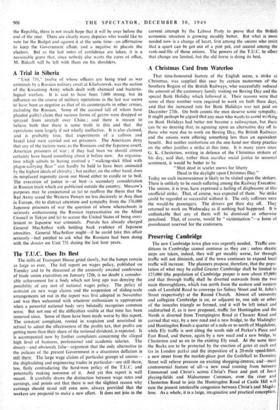A Christmas Card from Waterloo
That time-honoured feature of the English scene, a strike at Christmas, was supplied this year by certain motormen of- the Southern Region of the British Railways, who successfully reduced the amount of the customary family visiting on Boxing Day and the special Bank Holiday which followed it. Their reasons were that some of their number were required to work on both these days, and that the increased rate for Bank Holidays was not paid on December 27th. On both counts the men deserve some sympathy. It might perhaps be argued that any man who wants to avoid working on Bank Holidays had better not become a railwayman, but there can be no denying that,, in agreeing upon an alternative day off to those who were due to work on Boxing Day, the. British Railways and the unions were offering something less than an equivalent benefit. But neither misfortune on the one hand nor sharp practice on the other justifies a strike at this time. It is many years since G. K. Chesterton, writing in defence of the Christmas strikers of his day, said that, rather than sacrifice social justice to seasonal sentiment, it would be better to be " Shot dead in scarlet snows for liberty Dead in the daylight upon Christmas Day."
Today no such inconvenience is likely to be visited upon the strikers. There is unlikely to be much suffering among the Railway Executive.
The unions, it is true, have expressed a feeling of displeasure at this unofficial strike. That, of course, was expected of them. No strike could be regarded as successful without it. The only sufferers were the would-be passengers. The drivers got their day off. They returned to work on Wednesday as if nothing had happened. It is unthinkable that any of them will be dismissed or otherwise penalised. That, of course, would be " victimisation "—a form of punishment reserved for the customers.






























 Previous page
Previous page